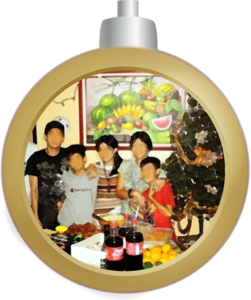We all do things for a reason. I remember doing school assignments until really late at night when I was a student. I asked my parents for money to buy the stuff I needed. When I finally graduated from school, I no longer did homework, and because I am now employed, I no longer ask my parents for money.
In the same way, we Filipinos observe many traditions during the Christmas season. Originally we did them for a reason, but are all of them still relevant to our lives?
 Caroling
Caroling
A few days before Christmas, carolers, usually groups of children, go from house to house to sing Christmas carols hoping to receive some money. The kids do this for fun, but adults also do this to raise funds for their projects.
This tradition cultivates friendship and creativity among the carolers. It also reminds us of some important Filipino values. Hazel Alviz, in her online magazine article entitled “Karoling!” writes: “Pasko na Naman” and “Ang Pasko ay Sumapit” are fast, joyous songs that celebrate the coming of the Savior. “Ang Pagmamano” and “Mano Po Ninong” relive the value of respect through the kissing of the hand.”
 Simbang Gabi
Simbang Gabi
Simbang Gabi is a nine-day series of masses from December 16 to December 24 and has varying schedules from as early as 3:00 AM to as late as 7:00 PM. The last day of the series is called Misa de Gallo, which is celebrated around midnight of Christmas Eve. According to Filipino traditions, any Juan who completes all nine masses will have one of his or her wishes granted. Even those who aren’t very religious suddenly become avid churchgoers at this time of the year.1
If our reason for keeping this tradition is to make God grant our wishes, then we can let go of this because God loves us unconditionally. He blesses us not because we consistently attend mass for 9 consecutive days, but because He is a good God.
 Christmas Party
Christmas Party
The more friends we have, the more Christmas parties we are invited to at Christmastime. It is good to keep this tradition because it reminds us that life is not just forwork but also for enjoyment; we can enjoy our time together with friends, co-workers and families.
 Santa Claus
Santa Claus
Besides encouraging children to believe a lot of things that are not real, the real danger of Santa Claus, is telling children to behave so that they will get a gift. We want our kids to be obedient and respectful all the time, not just during Christmas. This happens when they understand what Jesus has done for them. The Bible says God doesn’t keep a list. “If You, Lord, should keep an account of sins and treat us accordingly, O Lord, who could stand? But there is forgiveness with You…” Psalm 130:3-4. God does not bless us because we are good; He blesses us because He is good.
 Noche Buena
Noche Buena
This tradition brings the whole family together. Sometimes it is a venue to restore broken relationships and it is an opportunity to show how special a person is to you.
 Parol
Parol
Parol, also known as the Philippine lantern is a unique Filipino decoration traditionally made from colorful papers, bamboo sticks, and shaped-like five-pointed star. In 1928, these lanterns were originally designed to help villagers find their way to chapels and churches to pray. Also, these lanterns are used to further enhance the spirit of Christmas. Putting up parols in homes, schools,
establishments, offices, and schools is a common Filipino tradition.2 This is great tradition to keep for it is a sign of hope that a Light has come into the world.
In conclusion, the best thing to do is to really think about what you do during the Christmas season. Choose your activities for their meaning to you, not just because tradition dictates how to celebrate.




